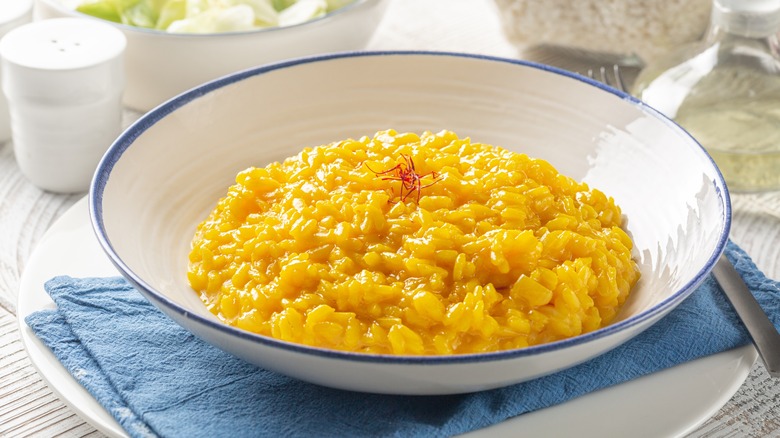Via Carota's Foolproof Tip For Risotto Is To Stop Spending Money On Stock
When faced with a time crunch and/or limited culinary skills, most of us turn to Italian food. A jar of tomato sauce, a box of dry pasta, perhaps a pre-made pizza dough with free reign over toppings... Italian food at its simplest has a reputation for being comforting and easy to prepare on a budget, making it basically every college student's dream. This is why it may come as a surprise that one of the hardest dishes to master is no complex French sauce: It's an Italian risotto.
Several things can go wrong when you make risotto — Just ask one of the many "Masterchef" and "Chopped" contestants that have been sent home over the seemingly innocent rice dish. Making risotto requires an excellent judgment of timing. Over-stirring is the most common pitfall and nailing the perfect al-dente texture of the arborio rice is easier said than done.
Risotto happens to be a very hands-on dish that needs to be fed liquid in slow intervals. The liquid that you choose can also make or break the dish. In fact, Mike Lata, chef and co-owner of Charleston-based restaurant Fig, tells MyRecipes that risotto is only as good as the broth that it's cooked in, preferring to use lighter broths like chicken stock over stronger options like lobster or shrimp. But while Lata and several others make their risotto with stocks and broths, the New York trattoria Via Carota thinks that the secret to a good risotto is far simpler.
Water can make a better risotto
In a recipe published in the Via Carota cookbook by the restaurant's chefs and co-authors, Jody Williams and Rita Sodi say that a dish like their Risotto al Limone not only doesn't need stock, but is actually better without it. In a recipe where humble ingredients like Meyer lemons are supposed to shine, a meaty broth would only take away from the subtle flavor of the citrus fruit. As Williams told Epicurious, "adding, for example, a chicken stock, would make it a chicken lemon risotto." Instead, water and a bit of white wine do the job just as well while still giving you control over the risotto's flavor.
When using water as the liquid for risotto, however, make sure that you're using boiling hot water and not water that's cold. Additionally, adding a pinch of salt to the water can go a long way in giving the risotto flavor. Alternatively, you could also infuse your liquid with herbs and spices to still give the risotto subtle layers of flavor without the head-on punchiness of a meat or vegetable-based broth. By using water, you'll be able to let the true ingredients of your risotto shine without a broth sharing the limelight.

